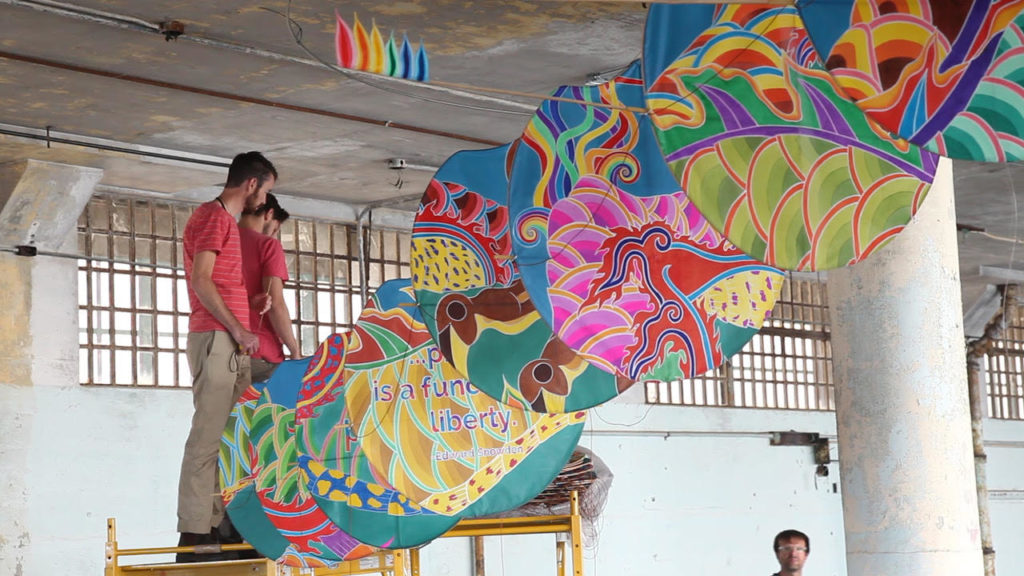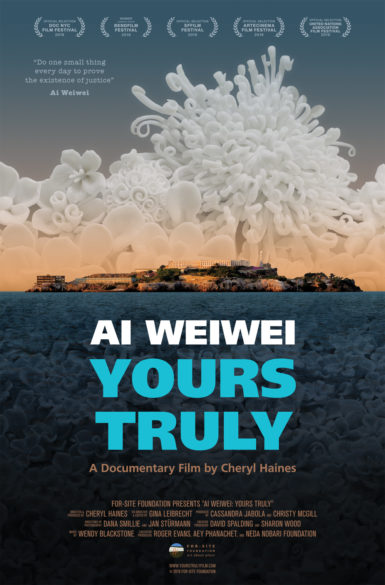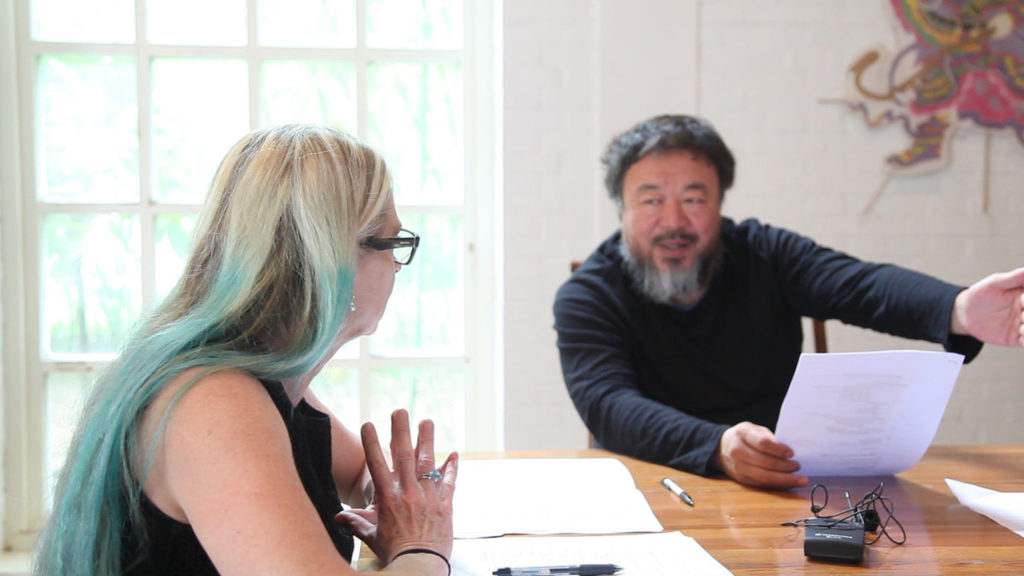[ad_1]

Ai Weiei’s 2014 exhibition on Alcatraz is readied, in a scene from Ai Weiwei: Yours Truly.
COURTESY FOR-SITE FOUNDATION
Ai Weiwei: Yours Truly, a new documentary by San Francisco gallerist Cheryl Haines, is a moving cinematic experience and so wide-ranging a project that it is likely to appeal even to those who might not think they are interested in the famed artist. Sadly, it is having only a one-day stand in New York this weekend as part of the DOC NYC festival. If you can make it to IFC in Greenwich Village at 12:15 p.m. on Sunday, be there. Otherwise, hope for a wider theatrical release soon.
Ai Weiwei: Yours Truly began as a feature about “@Large: Ai Weiwei at Alcatraz,” the public art project that Haines and the artist collaborated on in 2014, while Ai was still under house arrest in Beijing after his three-month imprisonment in 2011. Unable to travel from China and visit the site, he nonetheless designed an exhibition perfectly suited to the long-closed federal penitentiary-turned-national park. It amounted to a tribute to political prisoners around the world.
With the help of teams of assistants, over 100 larger-than-life pixelated portraits of jailed individuals were created out of millions of Lego blocks. Over 900,000 people visited the site during its seven-month run, certainly a large-enough crowd to mark the project as a major success and justify a documentary to capture it.

Ai Weiwei: Yours Truly.
COURTESY FOR-SITE FOUNDATION
Known the world over for his stance against the Chinese government, which more recently has expanded into a broad-based campaign for human rights, Ai is also a master of self-promotion, and is particularly adept at training the spotlight on his favorite causes. A documentary on so lionized a figure could have become a vanity project, given that the subject himself was involved in its creation. However, Haines, a first-time director, has managed to situate him in a larger context, rescuing the film from charges of narcissism.
Haines (who also could have turned this into her own opportunity for self-promotion, given her role as organizer and executive director of the For Site Foundation, the chief sponsor of the Alcatraz show) ultimately made Ai Weiwei: Yours Truly into an examination of the recent history of political repression.
Early on, she incorporates astounding footage of China in the 1950s, when Ai’s father, the venerated poet Ai Qing, was a victim of the Anti-Rightist Campaign and was sent to a work camp in Xinjiang Province. With testimony from the artist’s mother Gao Ying and his brother Ai Dan and a scattering of remaining family photographs, the film conveys the insurmountable hardships and degradation they faced in exile. At another point, the film examines the history of Alcatraz as a site of oppression and protest, ranging from the detainment of Hopi leaders in 1895 to the occupation of the island by Native American activists in 1969.
Ai’s Alcatraz project tied together all these threads in a postcard component that encouraged visitors to send messages to imprisoned activists of their choosing—thus the film’s name, Yours Truly. Ai was inspired to create this interactive artwork by the memory of his father receiving an anonymous postcard praising one of his poems while still in exile. Though just a child at the time, Ai recalls the momentary look of happiness on his father’s face.
The artist’s postcards, with innocuous pictures of birds and flowers from certain activists’ home countries, also made a profound impact on their receivers.

Ai Weiwei: Yours Truly director Cheryl Haines and the artist.
COURTESY FOR-SITE FOUNDATION
Haines and Ai heard back from hundreds of family members and from those who were able to reply from their jail cells. Recipients ranged from the Egyptian Arab Spring activist Ahmed Maher to former U.S. intelligence officer John Kiriakou, who disclosed the Bush Administration’s use of waterboarding program and served prison time for releasing other classified information. According to the film, these postcards gave them hope at some of their bleakest moments of imprisonment.
One of the finest moments in the film is a scene where Ai, now free to travel and living in Berlin, visits government whistleblower Chelsea Manning after her release from prison. He had sent her a postcard saying, “Keep strong and hold on to your idea.” Whatever you think of Manning’s disclosure of classified information to WikiLeaks, it is powerful to see the once-embattled pair meeting as free equals.
At an early point in the film, Ai explains himself by saying, “It is your duty as an artist to fight for freedom of speech. That is the soul of any creativity.” The documentary demonstrates that there is a worldwide network of people who feel the same way, and who have taken great risks to make their voices heard.
As the credits roll, names of imprisoned dissidents are listed, broken down by individual countries. China has the longest list by far, underscoring how brave Ai once was to speak out when he was living there, and how lucky he was that his detention ended after 81 days. This side of the artist is sometimes lost when audiences visit his less politically engaged exhibitions, and even when critics review his work. Ai Weiwei: Yours Truly makes the case that such engagement is always at the forefront of his thinking, not only when he finds himself in front of a camera.
[ad_2]
Source link

